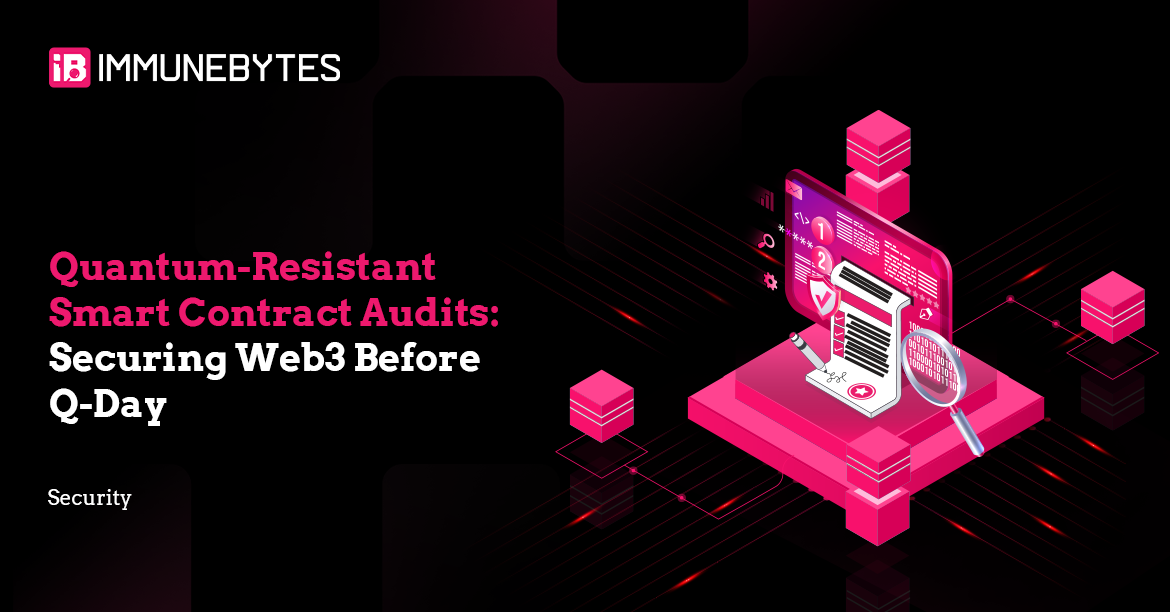The future of Web3 security isn’t just about catching reentrancy bugs or gas griefing. It’s about preparing for a moment that could reset the cryptographic foundations of the entire blockchain ecosystem, the arrival of Q-Day.
This hypothetical but fast-approaching point in time marks when quantum computers become powerful enough to break today’s cryptography. And when that happens, everything from multisigs to DAO treasuries to your hot wallet’s private key could be vulnerable. The time to prepare is now, and smart contract auditors have a key role to play.
Why Q-Day Matters to Smart Contracts
Most smart contracts, and nearly all wallets, use elliptic curve cryptography (ECC), specifically the secp256k1 curve. It’s battle-tested against classical computers, but extremely vulnerable to Shor’s algorithm, which runs on quantum machines.
Here’s the real threat: everything on-chain is already public. Attackers can harvest encrypted data today, like contract signatures, wallet addresses, and cross-chain proofs, and simply wait for quantum machines to decrypt them in the future.
So even if Q-Day is a decade away, the risk is present now. That’s why protocols must begin hardening their contracts, wallets, and infrastructure before that day arrives.
Enter Post-Quantum Cryptography (PQC)
The solution? Post-quantum cryptographic algorithms, or PQC, that are resilient to quantum attacks.
Leading contenders include:
- NTRU: a lattice-based scheme, efficient and fast
- SPHINCS+: hash-based, stateless, and standardized
- CRYSTALS-Dilithium: chosen by NIST as a signature standard for the post-quantum world
These cryptosystems aren’t speculative. NIST finalized its PQC standards in 2024, and governments, fintech firms, and global institutions are already beginning the migration. Web3 is next.
What Auditors Should Be Doing Now
This shift introduces new responsibilities and opportunities for smart contract auditors.
1. PQC Vulnerability Mapping
Audit firms should assess if and where protocols depend on quantum-vulnerable keys. Wallets, multisigs, access control layers, and oracle signatures are top priority.
2. Cryptographic Agility Checks
Can the protocol upgrade its key verification logic without a full redeploy? Are signatures modular or hardcoded? Crypto-agility will be a central design factor moving forward.
3. Hybrid Signature Simulations
Contracts will soon need to support both traditional and PQ-safe keys. Auditors should test how hybrid verification logic handles edge cases, unexpected upgrades, and gas constraints.
4. Public Key Surface Analysis
Many wallets and contracts have exposed their public keys. Auditors should identify these cases and flag them as “Q-vulnerable,” even if the rest of the system seems solid.
Who’s Getting Ahead?
Several top audit firms are already watching this horizon.
Trail of Bits has explored lattice-based crypto in prior research and maintains internal expertise in advanced cryptographic verification.
CertiK and OpenZeppelin have acknowledged cryptographic assumptions as a key risk area in recent blogs and post-mortems.
Expect new offerings like “Quantum Readiness Reports” and “PQC Certs” from forward-looking security teams in the coming year.
What’s Next?
The next wave of audit trends will include:
- Quantum-Aware Audit Frameworks: Static analyzers and review checklists that explicitly flag quantum-vulnerable logic
- Quantum-Resistant Wallets: Support for PQC signatures in tools like MetaMask, Ledger, and Brave
- zk + PQC integrations: Protecting proof systems from long-range attacks using lattice-friendly primitives
And soon, real-time testnets will likely simulate quantum-based attack vectors, rewarding protocols that can withstand them.
Final Thoughts
Quantum computing isn’t science fiction anymore. And for blockchain, the threat it poses is unique; everything is public, permanent, and trustless. If your protocol uses a vulnerable key system today, it could be compromised years from now without a single line of code being touched.
Auditors who understand this risk and begin offering real PQ-readiness services won’t just protect clients. They’ll lead the future of smart contract security.
Because when Q-Day arrives, it won’t care how secure your system used to be. Only what you’ve done to prepare will matter.

